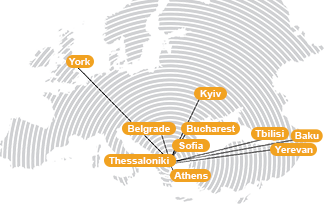In order for the European Union (EU) to be successful in implementing and expanding open innovation as one of the main driver of its socio-economic growth, higher education institutions (HEIs) must be able to produce independent, creative, entrepreneurial individuals, who understand inter- and multidisciplinary challenges of the socio-economic environment and as a result can contribute to open innovation in true convergence with technological growth & enterprise digitalization. EU's success in the global competition is heavily dependent on the ability of the economy to produce innovative enterprises with high growth potential that can give stimulus to the actors of the socio-economic environment. Creating a common framework and a unified entrepreneurial ecosystem across the EU requires a core engine of open innovation and co-creation among all the involved stakeholders in order for the inequality among the regions of the EU to be decreased. Achieving an empowered society that co-creates together with the market will provide a much proper context for growth, as society is the main driver of growth.
Secondly, pierced by severe environmental concerns and eco-innovation, society pushes the actors (and vice-versa) for more innovative growth mechanisms that are more resource efficient and environmentally sustainable. Such shift not only that ensures long terms sustainability and societal development by improving living conditions, but it also drives the need for more innovation and knowledge exploitation towards finding unique solutions to growth in a digitally driven QUINTUPLE HELIX context (comprising of university, industry, policy, society, environment) where digital and responsible (socially & environmentally) entrepreneurship (DREP) should be the driver of sustainable development. One way of achieving a working quintuple helix to foster DREP is through co-creation. Chesbrough (2013) argued that cocreation is the cornerstone of open innovation practices in today's society. For example, through co-creation, academia can gain useful input from the other stakeholders, that will eventually lead to more market oriented curriculum and better prepared graduates capable to implement responsible entrepreneurship (Chesbrough 2010; Chesbrough 2011). More recently, Carayiannis (2015) introduced the concept of targeted open innovation arguing that open innovation should be focused, strategic, and tailored to the current needs of the stakeholders, thus universities need to enhance their curricula accordingly.Hence, open innovation and co-creation between academia and stakeholders will highly increase academia's capacity of producing more market oriented curricula that will lead to graduates capable of being next generation leaders in responsible entrepreneurship.
To this end, DIGI-GRENT responds to this need by aiming to develop an innovative, transnational framework that will improve the knowledge and skills of academic institutions to produce more marked/startup oriented DREP curricula, reducing the barriers in this field. The project consortium comprises key academics, investors, industry/eomployment associations, startup associations, and societal growth partners (and associated partners) from different sectors who will co-create the envisaged DREP curriculum and will pilot it through an open innovation and co-creation virtual learning environment (VLE). This outcome is directly pertinent to quintuple helix-academia cooperation for innovation and best practices with respect to DREP, and can also support policy reform in this area, leading to more prepared graduates ready for the startup market. DIGI-GRENT also follows up the recent plans of the EU to promote improved, efficient and clean operations by 2050 and is also relevant to the EU2020 targets for R&D, climate change, energy efficiency, entrepreneurship and social cohesion. This makes DIGI-GRENT directly relevant to the current objectives of the participating organizations. Additionally, DIGI-GRENT is aligned with the goals of Strategic Partnerships for academia-market-society collaboration and the promotion of innovation and best practices, with the Headline Education Target and with the EU Higher Education Modernisation Agenda. Similarly, DIGI-GRENT is in line with the European cooperation in education and training (ET2020) strategy by fostering life-long-learning, improving the quality of education through stakeholder engagement, and promoting creative thinking towards DREP. The following reports and efforts are the base foundation of DIGI-GRENT: CEDEFOP’s report on Environmental Skill Promotion (2016); OECD’s report on Digital Entrepreneurship Skills for Young Entrepreneurs (2015); EU Commission’s JRC Report on 2035 Sustainable Economy (2015); EU’s EPALE platform report on Sustainable Business Skills (2017); EU Commissions New Skill Agenda for Europe (Employment and Social Performance) (2016); WEF Report on Graduate Skills for Enterprise (2016).





